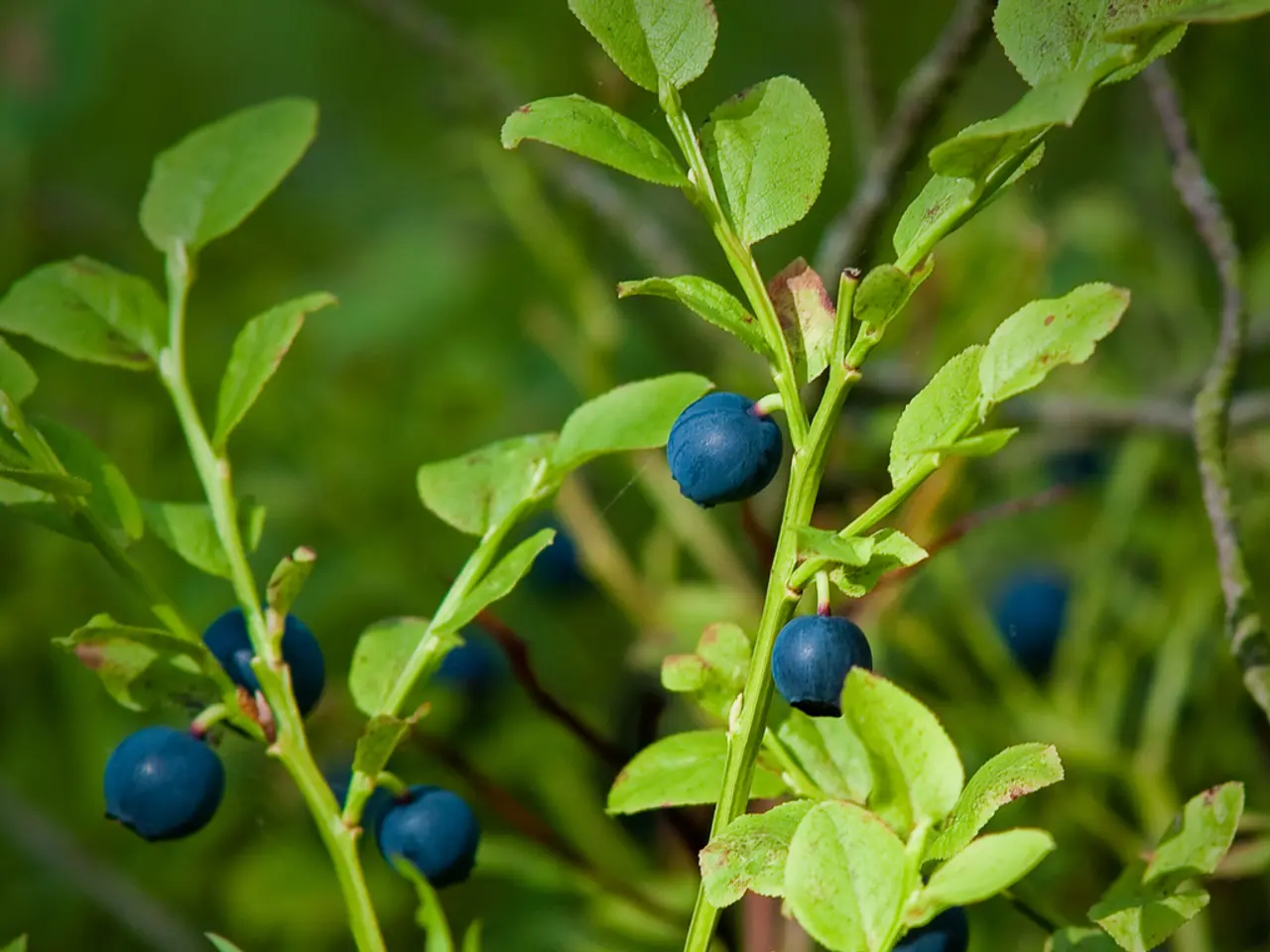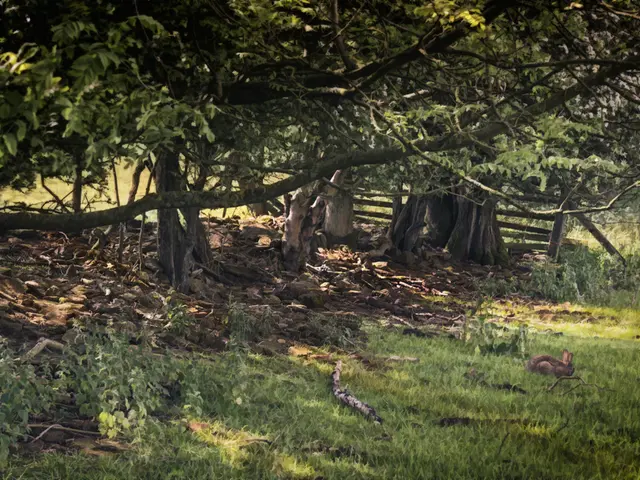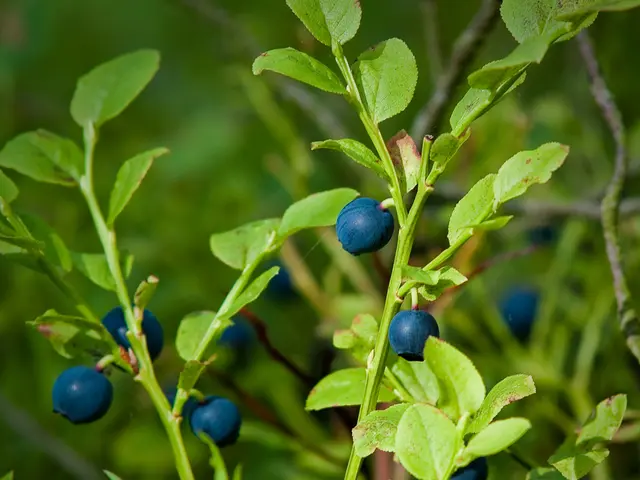Urban Cold-Climate Berry Picking: Aronia vs Goji
Cultivating Aronia and GojiBerries in an Urban Backyard Setting
Cultivating berries in an urban garden, even in cold climates, can be a rewarding venture. Let's take a closer look at two super berries often grown in such settings: Aronia and Goji. If you're eager to maximize your urban gardening space, it's time to weigh the merits of these super berries.
The Chokeberry Challenge: Aronia Berries
Originating from North America and Canada, Aronia berries, also known as chokeberries, are tough little plants that thrive in Zone 3a. In our experience, these shrubs have shown remarkable resilience against winter's chill. The varietal we've opted for is the Viking Aronia from T&T Seeds.
At maturity, this captivating bush typically reaches about 5-6 feet, although our specimen remains smaller. In spring, it blossoms with beautiful white clusters of flowers, which transition into dark berries in late summer. Autumn brings an additional color show with changing leaves.
Contrary to some assumptions, Aronia berries have not exhibited an invasive suckering habit in our garden. However, we wouldn't mind a few more bushes! The berries are undeniably tart, yet some sweetness is present. Their versatility extends to baking and preserving, ensuring that these super berries won't go unused in your kitchen. Simply put, this berry offers more than just superfood status, boasting a taste that holds its own.
Ripe Aronia berries can be harvested when they've turned a deep purple-black hue on the exterior and are red on the interior. The stem also turns red, and the fruit releases easily when ready to pick. You can pick individual berries from clusters or gather whole clusters for convenience.
These versatile berries can be enjoyed fresh, dehydrated, or frozen. Alternatively, try making a tart jam to preserve them. So, if you're considering adding Aronia berries to your urban garden, let us reassure you – this dynamic duo is here to stay!
The Goji Gamble: Wolfberries
Goji berries, or Wolfberries, are renowned for their rich nutritional profile. This berry is said to boast impressive amounts of vitamins and minerals. We sourced our Goji berry plant from T&T Seeds as well.
Upon planting, we found the seedlings slow to take root, but they soon proved to be unstoppable. Contrary to certain claims, Goji berries tend to be highly invasive due to their aggressive suckering.
Although our prized shrub failed to make it through the winter, the roots persevered and are now creating new shoots. However, we're yet to see any fruit on this new growth, so more testing is needed to assess its viability.
The Goji berry plant is undeniably attractive, with purple flowers and bright red fruit gracing it throughout the summer months. Unfortunately, the fruit's availability makes picking a challenging task.
In terms of taste, Goji berries are mildly sweet but not overly flashy. Some cultures use the leaves, shoots, and berries in stir-fries and soups, demonstrating their culinary versatility. As a snack, we've found ourselves hiding them in smoothies to disguise their less-than-delicious flavor.
For dehydrating or freezing, these berries provide a nutritious addition to your preserved goods. Dehydrated, they can even be a tasty snack!
Given their invasive nature and sensitivity to frost, we don't recommend Goji berries for urban gardens with cold climates. Instead, give Aronia berries a try for a more suitable super berry option.
The Final Verdict: Aronia vs Goji
After attempting to grow these super berries in our urban cold-climate garden, our personal preference leans towards Aronia berries. Its cold-hardiness, adaptability, and versatility make it an ideal choice for a cold-climate urban garden. Goji berries, on the other hand, require more specific conditions and might struggle in a colder urban setting compared to Aronia.
We encourage you to share your thoughts on growing Aronia and Goji Berries in an urban cold-climate garden. Whether you're a seasoned gardener or just curious about urban farming, let's engage in a vibrant gardening conversation!
Stay up-to-date on our latest gardening tips by subscribing to our website and following us on Instagram, Facebook, or Pinterest. Happy gardening!
For more gardening inspiration, explore the following posts:
- Dealing with Garden Weeds
- Hydroponic Tower Gardening in Cold Climates
- Supporting Tomato Plants
- Transplanting Tomato Plants
- Hardening off Seedlings
- Transplanting Seedlings
- Pre-Soaking Seeds
- Soil for Seedlings, Container Gardening, and Raised Beds
- Northern Vegetable Garden Planting Schedule
- Starting Vegetable Seeds Indoors
- Cultivating Aronia berries and Goji berries in an urban garden, even under cold climates, can offer rewards in taste, health, and aesthetics.
- The Viking Aronia bush, originating from North America and Canada, has thrived in Zone 3a despite winter's chill, presenting beautiful spring flowers, dark summer berries, and autumn color changes.
- Contrary to some beliefs, Aronia berries have not displayed any invasive suckering habit in our urban garden, but their versatility in baking, preserving, and taste make them a favorite.
- Ripe Aronia berries can be harvested when they turn a deep purple-black exterior with red interior and release easily from the stem.
- Goji berries, or Wolfberries, are highly regarded for their nutritional profile, though they can be challenging to grow in cold urban climates due to their aggressive suckering and sensitivity to frost.
- In terms of taste, Goji berries are mildly sweet, and their leaves, shoots, and berries are used in various culinary applications, demonstrating their culinary versatility.
- For urban gardens with cold climates, Aronia berries are recommended over Goji berries due to their cold-hardiness, adaptability, and versatility, making them more suitable super berry options.







